Factors Affecting Weight
- Gravitational pull: The weight of an object is directly proportional to the strength of the gravitational force acting on it. On Earth, the standard acceleration due to gravity is 9.81 m/s2.
- Mass: The weight of an object is also directly proportional to its mass. The greater the mass, the greater the force of gravity acting on it, and hence, the greater the weight.
Calculating Weight
The weight of an object can be calculated using the formula:
Weight = mass × acceleration due to gravity
Units of Weight
The standard unit of weight in the metric system is the newton (N), while in the imperial system, it is the pound (lb) or ounce (oz).
Study Guide
Here are some key points to remember when studying the concept of weight:
- Understand the difference between weight and mass.
- Be able to calculate the weight of an object using the formula: Weight = mass × acceleration due to gravity.
- Practice unit conversions between different systems of measurement (e.g., newtons to pounds).
- Understand how weight can change in different gravitational environments (e.g., on the moon or other planets).
[Weight] Related Worksheets and Study Guides:
.◂Science Worksheets and Study Guides Sixth Grade. Our impact on earth
Study Guide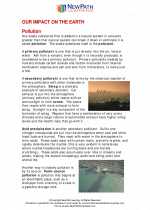 Our impact on earth
Our impact on earth  Worksheet/Answer key
Worksheet/Answer key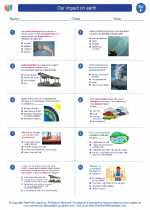 Our impact on earth
Our impact on earth  Worksheet/Answer key
Worksheet/Answer key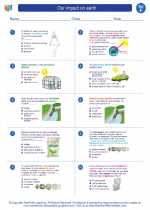 Our impact on earth
Our impact on earth  Worksheet/Answer key
Worksheet/Answer key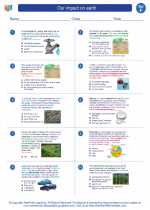 Our impact on earth
Our impact on earth  Vocabulary/Answer key
Vocabulary/Answer key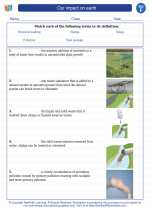 Our impact on earth
Our impact on earth 

 Worksheet/Answer key
Worksheet/Answer key
 Worksheet/Answer key
Worksheet/Answer key
 Worksheet/Answer key
Worksheet/Answer key
 Vocabulary/Answer key
Vocabulary/Answer key

The resources above cover the following skills:
EARTH AND SPACE SCIENCE
Earth’s Systems
Analyze and interpret data (e.g., tables, graphs, maps of global and regional temperatures; atmospheric levels of gases such as carbon dioxide and methane; rates of human activities) to describe how various human activities (e.g., use of fossil fuels, creation of urban heat islands, agricultural practices) and natural processes (e.g., solar radiation, greenhouse effect, volcanic activity) may cause changes in local and global temperatures over time.
Earth and Human Activity
Analyze evidence (e.g., databases on human populations, rates of consumption of food and other natural resources) to explain how changes in human population, per capita consumption of natural resources, and other human activities (e.g., land use, resource development, water and air pollution, urbanization) affect Earth’s systems.
Implement scientific principles to design processes for monitoring and minimizing human impact on the environment (e.g., water usage, including withdrawal of water from streams and aquifers or construction of dams and levees; land usage, including urban development, agriculture, or removal of wetlands; pollution of air, water, and land).